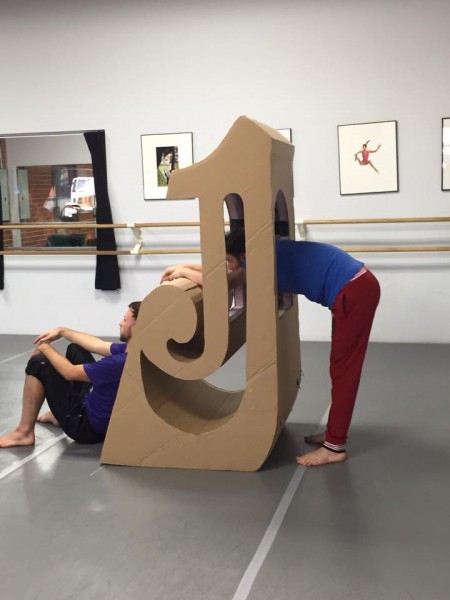Moving Poets: From the Depths
 Mark this week. It is one of the rare weeks in a year’s calendar when the Moving Poets are all here and performing. As a devoted fan, I found myself a third row seat in the Booth Playhouse last night so I could hear the feet pounding on the stage and the heavy breathing of dancers at the end of a movement. I wanted it all. My only regret– sometimes it’s fun to watch from on high in the Booth so one can observe the musicians as well.
Mark this week. It is one of the rare weeks in a year’s calendar when the Moving Poets are all here and performing. As a devoted fan, I found myself a third row seat in the Booth Playhouse last night so I could hear the feet pounding on the stage and the heavy breathing of dancers at the end of a movement. I wanted it all. My only regret– sometimes it’s fun to watch from on high in the Booth so one can observe the musicians as well.
With Moving Poets one expects the unexpected. “De Profundis” is a piece that combines the actual writing of Oscar Wilde while he was imprisoned on charges of gross indecency/homosexuality, with the court transcripts. As the curtain opens one is led in immediately by way of Adora Zachary’s costume design and the set, to sense an odd spare elegance. Wilde’s writings reveal his artist’s take on sorrow and its partner beauty. The costumes of the dancers evoke imprisonment, with strident black bars across their backs, which they repeatedly turn to the audience. The dance seems to reflect the horizontal and vertical limitations of movement one would experience constrained by imprisonment. Into this mix David Crowe and Daveed Korup, percussionists, remind us of everything from the human heartbeat to the ticking of a clock. Scott Helm is the embodiment of Wilde and Cynthia Farbman-Harris a terrifying vengeful judge.
“Usually Strange” is a world premier collaboration between Moving Poets Charlotte and Berlin which is based on Oscar Wilde’s final work “The Ballad of Reading Gaol”. It references, once again, his imprisonment with the refrain, explored through sound, dance, text, music, sculpture and projected visual art, that “each man kills the things he loves”.
In “Usually Strange”, the dancers costumes were, appropriately, chosen by the performers, as they portray a slice of human communal life. What begins as an apparent pas de deux quickly becomes a pas de trois, and then an ensemble expressing every kind of human interaction and connection. Shadows are incorporated into the mix, and the dance bows to sculpture, cobbling wonderful abstract forms out of the interaction of multiple bodies. Props that are likewise abstract forms become vehicles for exploring more interactions. The use of space in this dance is nothing short of thrilling. Tanja Bechtler on cello and Adam Watkins, pianist, draw us into pathos. It is dance and sculpture, playful, serious, haunting and soulful, set to a song sung by a cello.
It was a night of art. It was an event marked by courage, with little regard for our amusement, taking the threads of sorrow, prejudice and imprisonment and spinning from them more questions than answers. It was the perfect marriage of beauty and sorrow. My gratitude for this journey into the collective imagination of this group of gifted artists.


Recent Comments